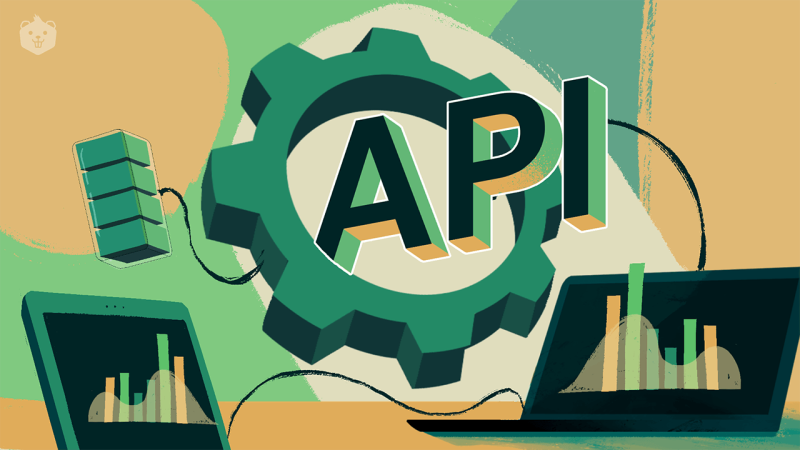Application Programming Interfaces, or APIs, play a pivotal role in modern web development as the building blocks that power your favorite websites and applications. They enable integration of unique functionalities from external services, significantly extending the capabilities of web applications.
This article delves into the integral role of APIs in web development, elucidating how they aid in integrating and extending functionality. Moreover, we will also look into different types of important API types so that you can understand the functionality better.
This article will serve as a guide to help you understand the power of APIs and how to use them.
What is an API?
API stands for Application Programming Interface, a set of protocols that enables communication between two applications over the network. It assists in data exchange by providing access to various functionalities from one application to another without any manual intervention. This allows developers to quickly and cost-effectively integrate external data sources into their projects.
API acts as a bridge between two applications, handling requests from one application and returning responses in an understandable language. It uses the HTTP protocol or other communication languages like SOAP and XML-RPC to carry out its tasks.
For example, if you have an online store powered by a custom-made ecommerce platform, the API can help to quickly integrate it with third-party payment gateways such as PayPal and Stripe.
Types of APIs:
1. RESTful APIs:
RESTful APIs, or Representational State Transfer APIs, have transformed the way applications communicate with each other. They use HTTP methods to retrieve, create, and manipulate data. Their simplicity and scalability have made them a favorite among developers worldwide.
2. SOAP APIs:
Simple Object Access Protocol (SOAP) APIs are a protocol for exchanging information in web services using XML. They Are known for their robustness and security, making them an excellent choice for financial services and other sectors where data protection is paramount.
3. JSON-RPC and XML-RPC:
JSON-RPC and XML-RPC are protocols that allow for remote procedure calls. They use JSON and XML, respectively, to encode data. These APIs are versatile, enabling software on different platforms to interact seamlessly.
4. GraphQL:
GraphQL is a relatively new API technology that allows clients to define the structure of the data. This eliminates unnecessary data transfers, leading to more efficient applications.
5. WebSockets:
WebSockets provide a persistent connection for real-time data transfer between the client and server. Used extensively in live chat applications and multiplayer games, they represent a leap forward in real-time communication.
6. OData (Open Data Protocol) APIs:
OData APIs are used to query and manipulate data using standard HTTP protocols. They provide a simple and standardized process for interacting with data, regardless of the application or database.
Roles of APIs in web development:
Facilitating Integration:
APIs, or Application Programming Interfaces, serve as the messenger that relays requests and responses between different software systems. They play an integral role in web development for online businesses by allowing software systems to communicate and integrate with each other.
This integration is crucial in today’s interconnected digital landscape, where applications often need to interact with other services and databases to function effectively. By providing a common language for these interactions, APIs streamline the integration process, enabling developers to create more robust and versatile web applications.
Enhancing User Experience:
Another significant role of APIs in web development is enhancing the user experience. APIs facilitate the retrieval of data from external sources, such as social media platforms or weather forecasting services, and then incorporate that data into a web application in a way that’s useful and appealing to users.
This ability to pull in data from various sources and integrate it seamlessly into a website or app can dramatically improve the overall user experience, making APIs a vital tool in the arsenal of any web developer.
Promoting Scalability:
APIs also contribute to the scalability of web applications. With APIs, developers can add or modify features without disrupting the existing system, making it easier to scale the application as needed.
Moreover, APIs allow for the efficient use of resources, as they enable developers to leverage existing functionalities rather than building everything from scratch. This not only saves time but also contributes to the maintainability and scalability of the application.
Enabling Automation:
In the realm of web development, APIs are instrumental in automation. This allows software systems to manage tasks and processes without human intervention, increasing efficiency and accuracy. Whether it’s automating data entry tasks, triggering events based on specific conditions, or facilitating batch operations, APIs make it possible to automate a wide range of functions thereby enhancing productivity and reducing the likelihood of errors.
Boosting Security:
Security is a paramount concern in web development, and APIs play a critical role in bolstering it. APIs provide a layer of abstraction between the application and the underlying systems, which can help protect sensitive data and prevent unauthorized access. Additionally, APIs often include security protocols and standards that further enhance the security of web applications.
Driving Innovation:
Lastly, APIs drive innovation in web development. By exposing functionalities and data, APIs encourage developers to create new applications and services that might not have been possible otherwise. This fosters a culture of innovation and creativity, leading to the development of novel solutions and advancements in the field of web development.
To summarize, APIs are an essential tool in web development, allowing developers to quickly and easily integrate existing functionalities into their applications. Additionally, they facilitate automation, bolster security, and drive innovation. Ultimately, APIs are a key component of modern web development.
Regardless of what type of website you are building, using APIs is an essential part of the process. By leveraging existing services and data, designers can create dynamic websites with features that would otherwise be difficult or impossible to implement.
Moreover, taking advantage of robust security protocols and automated processes can make development more efficient and reduce the risk of errors.






